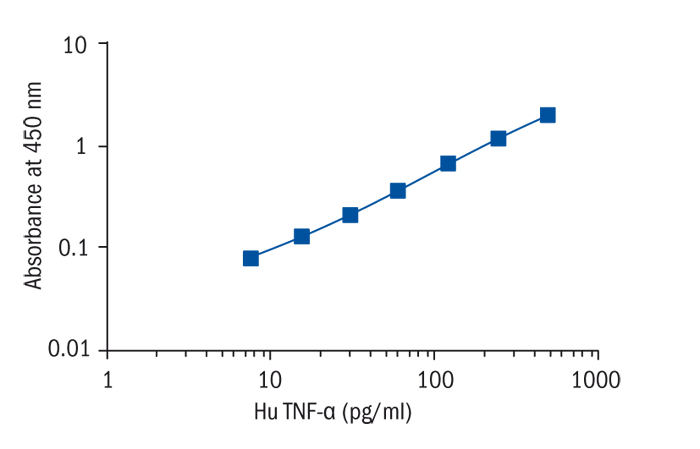Type
Sandwich ELISA, Biotin-labelled antibody
Description
The human TNF alpha ELISA is an enzyme-linked immunosorbent assay for the quantitative detection of human TNF alpha. The human TNF alpha ELISA is for research use only. Not for diagnostic or therapeutic procedures.
Applications
Serum, Plasma-EDTA, Plasma-Heparin, Plasma-Citrate, Urine, Cell culture supernatant
Sample Requirements
50 µl/well
Shipping
On blue ice packs. Upon receipt, store the product at the temperature recommended below.
Storage/Expiration
Store the complete kit at 2–8°C. Under these conditions, the kit is stable until the expiration date (see label on the box).
Calibration Curve
Calibration Range
7.8–500 pg/ml
Limit of Detection
2.3 pg/ml
Intra-assay (Within-Run)
CV = 6.0%
Inter-assay (Run-to-Run)
CV = 7.4%
Spiking Recovery
93,00%
Dilution Linearity
105,00%
Specificity
The interference of circulating factors of the immune systeme was evaluated by spiking these proteins at physiologically relevant concentrations into a human TNF alpha positive serum.
There was no interference detected, namely not with TNF-R (60 kDa and 80 kDa).
Features
- RUO
- calibration range 7.8-500 pg/ml
- limit of detection 2.3 pg/ml
- lyophilized controls
- intra-assay CV = 6.0%
- inter-assay CV = 7.4%
Research topic
Cytokines and chemokines and related molecules, Energy metabolism and body weight regulation
Summary
Tumor Necrosis Factor alpha (TNF alpha), also known as cachectin, is a polypeptide cytokine produced by monocytes and macrophages. It functions as a multipotent modulator of immune response and further acts as a potent pyrogen. TNF alpha circulates throughout the body responding to stimuli (infectious agents or tissue injury), activating neutrophils, altering the properties of vascular endothelial cells, regulating metabolic activities of other tissues, as well as exhibiting tumoricidal activity by inducing localized blood clotting. TNF alpha also inhibits lipoprotein lipase activity resulting in cachexia, a physical wasting condition. Activation of B-cells by the Epstein Barr virus can be inhibited by TNF alpha. Due to its varied actions throughout the immune system, TNF alpha may play a role in the pathogenesis of many disease states.
TNF alpha production is mediated by the action of lymphokines and endotoxins on the macrophage. Purified monocytes produce TNF alpha within four hours of stimulation by recombinant IL-2 and there is some in vitro evidence to suggest that TNF alpha is expressed at high levels and with prolonged kinetics in T cells stimulated by both CD2 and CD28. Secretion of TNF alpha is enhanced by gamma interferon. TNF then induces or enhances the specific production of Class I MHC antigen, GM-CSF, and IL-1. Recent evidence has suggested an intracellular role for this peptide.
Instructions for Use (RUO)
Instructions for Use (RUO)
Safety Information (RUO)
MSDS (RUO)
Find documents for the lot

